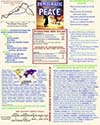[First published May 29, 2005] War remains ugly, a bloody evil, but one often necessitated for the democracies by the worse evil of not going to war. We should never forget, however, what war is like, and how even with the best of intentions, human lives can be squandered by the tens of thousands.
So it was in the Battle of the Somme in World War I, a battle that changed the public’s view of war. Up to that time war had been seen by too many as a glorious crusade against evildoers, replete with medals, parades, cheers, and handsome uniforms. And after World War I, when the horror and cost in lives of the Battle of the Somme became known, war was believed the worst of all evils. It spawned a general pacifism — a deep hostility to war, armaments, nationalism, and patriotism. Less than two-decades later, this fed the French and British appeasement of Hitler, and American isolationism, when confronting him might have avoided World War II. The general public learned the wrong lesson from the Battle of the Somme, and other such bloody battles in that war, and this lesson remains still deeply imbedded in our culture and helps fuel the antiwar movement.
Read the following docudrama and feel what war can really mean for the individual soldier, regardless of which side they are on.
***
Half squatting, Jimmy leaned against the side of the muddy trench, the toes of his boots invisible in the muck at the bottom. Jimmy was a short, skinny fellow, with a frame on which not even his military training could put muscle. His baggy uniform now rippled like a sail in a crosswind. His helmet hid his short brown hair, except when his shaking tipped it forward over his eyes and a few strands escaped.
Jimmy had grown up in Bristol, England. Before joining the army, he had spent most of his evenings drinking with his buddies at the local pub, or going to the new silent movies with them. That was his entertainment. Even at eighteen years of age, Jimmy had never gone out on a date and was shy of girls. His friends constantly ribbed him about being too embarrassed to participate when they’d dragged him off to a French bordello.
Once Jimmy had thought of going to college, and teachers had told him that he had the intelligence for it, but his father had never paid the family bills and later, he disappeared altogether, leaving Jimmy to support his mother and two sisters. He could read up and learn on his own, Jimmy told himself, and he did enjoy the rough and tumble of a warehouseman’s job.
Jimmy was part of the Army’s plan to create new volunteer divisions to fight alongside the regulars. The Army kept together as units all those volunteering from a particular company, town, or city neighborhood. This meant that Jimmy knew most of the soldiers around him, who in civilian life had drunk with him, sold him goods, or delivered ice or milk to his small home. Many had been his good friends. All but a few were now dead, as were his two best friends and his cousin. Jimmy had cried for hours after he had helped drag the upper half of his cousin’s body to the rear—all that remained of someone Jimmy had grown up with, played with, eaten many meals with, and, as boys do, argued with. Half his body gone!
As Jimmy waited for the scheduled cessation of seven days of shelling on the German trenches, he thought about dying. Despite his captain’s assurance that this next attack would be an easy victory, that Jimmy could walk over to the German lines and simply shove all the dead Germans out of the way, he knew he would die, as his friends had died. So he trembled as he awaited the silence that would follow the end of the shelling, and the captain’s whistle that would send him climbing out of the trench, to his death. He only hoped it would be quick and painless.
George Finch, crouched next to him in the trench, poked him in the side and leaned over to shout in his ear, “Jimmy, could you do me a favor?”
“What?” Jimmy yelled back.
“If I’m killed, will you give this to my mother?” George held out a small piece of dirty packaging from their rations. He had scrawled a few words on it with a blunt pencil. “You can read it,” George said.
It was easy to read in the dawning light, and said simply, “My Dearest Mom—I love you. Sonny.”
George lived several houses down from Jimmy on Bloy Street; Jimmy knew George’s mother. “Come on,” Jimmy said, “you won’t die.”
“Please!”
Jimmy shrugged and tucked the wrapper into his pocket. “Okay.”
At least this will make him feel better, Jimmy thought, although I’m the one that’s going to die.
Minutes later, there it was: The awful silence as the shelling stopped. Immediately, the officers came down the trench, getting them ready to move out. Jimmy heard the shrill whistle and then the yelling, and he scrambled out of the trench with all the others up and down the line and advanced on the Germans.
Jimmy’s jitters vanished. He focused everything on the trenches in the distance and unconsciously switched to automatic motion. Carrying sixty pounds of ammunition, food, water, and gear, he doglegged along the paths through their own barbed wire, moving at a slow walk through the mud.
“Please, God,” Jimmy kept murmuring, “no pain. Please, God, make it sudden.”



 Posted by rudyrummel
Posted by rudyrummel 






